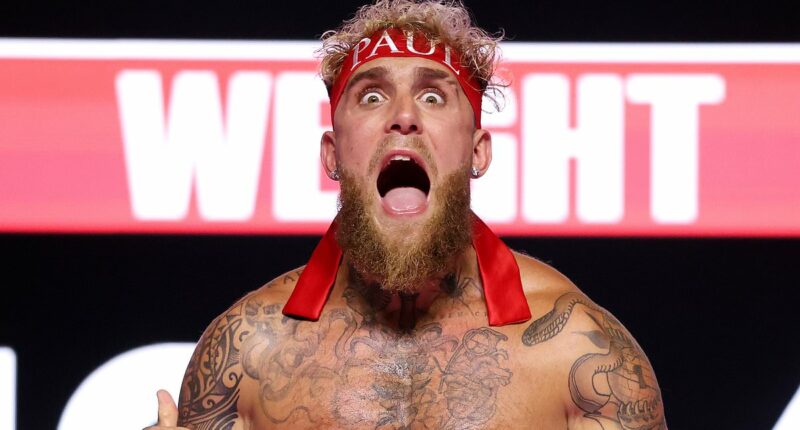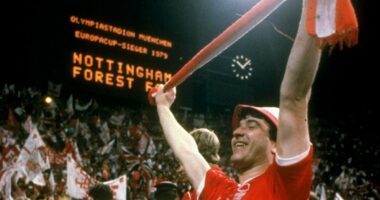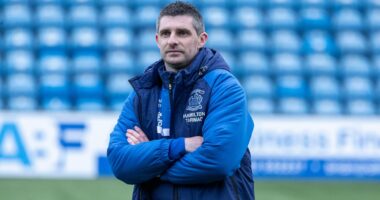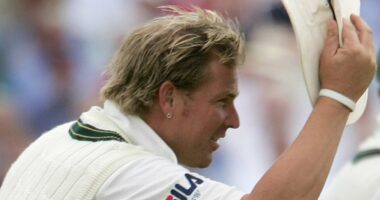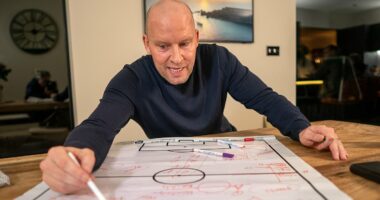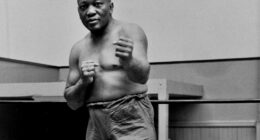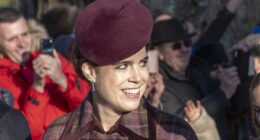Share this @internewscast.com
Jake Paul, widely recognized by his self-proclaimed moniker “The Problem Child,” continues to embrace this title through his multifaceted career.
The YouTube star, known for his unconventional flair, is set to face off against the formidable Anthony Joshua this Friday night, a bold move that has left many intrigued. Paul humorously claims that the inspiration for his ring name was sparked the very moment he entered the world.
“I was born in Cleveland on January 17, 1997, and I was a force to be reckoned with from the start,” Paul often remarks with a touch of bravado.
Adding to his diverse achievements, Paul has benefited significantly from partnerships with major mobile betting companies, propelling him toward his ambitious goal of amassing half a billion dollars before the age of 30.
His venture into boxing has been nothing short of daring, and his upcoming match against Joshua is seen by experts as a significant risk. The two are expected to share an impressive £140 million purse for their high-profile clash, which will be broadcast on Netflix.

The first pseudonym Jake Paul bestowed upon himself – and still the most frequently used – is The Problem Child

Paul is in a relationship with Norwegian speed-skater Jutta Leerdam (pictured last year in Abu Dhabi)

Paul shot to fame almost 15 years ago on Vine and quickly took his following over to YouTube
Regardless of opinions on Paul’s chances against an Olympic gold medalist and seasoned heavyweight champion, his ability to juggle multiple careers and ventures is undeniably impressive.
Nor that he is this century’s heir to PT Barnum as a showman.
Under the aegis of his own Most Valuable Promotions company, he is set to follow his compassionate circus act against a Mike Tyson exhumed from his retirement cannabis ranch — which pulled in more than 60million Netflix viewers, by the way — with a proper fight against Joshua.
Whether The Problem Child would have achieved all the above without the extreme tough love of a father he catalogues as ‘physical abuse’ is a matter for conjecture. Jake’s elder brother Logan, who is carving out his own parallel career in the digital world and the prize-ring, prefers to describe Dad’s conduct as ‘not quite legal’ since the term abusive has other connotations not pertinent to this discussion and ‘to which my father would rightly take offence’.
This is, after all, a family of Christian churchgoers.
Nevertheless, in a revealing Disney documentary early this year, Jake said: ‘My Dad would slap the s*** out of me.’ To which Mr Greg Paul, who has always denied ‘laying a hand’ on either son, responded: ‘Did I pick you up and throw you on a couch a couple of times? That’s what dads are supposed to do. Welcome to life. Get the f*** over it.’
Which, it has to be said, The Problem Child has duly done. To such enriching extent he quickly picked up this second nickname: The Disrupter. Paul has ploughed his own deep and rewardingly rebellious furrow through boxing — just as he has done on social media, engaging with the richest financial institutions and as a most rumbustious influencer. He posted his first video on Vine aged 14 and a year later he carried his 5.3million followers to his YouTube channel, which multiplied that figure fourfold.
Paul acted in the cult Disney series Bizaardvark and made larger-than-life appearances in a number of feature films.

He released a series of songs on YouTube including It’s Every Day Bro, which currently has 304 million views
But it is the titles of his vocal recordings that offer the clearest insight into this life: Ohio Fried Chicken, in memory of his boyhood eating habits. Randy Savage, to hallmark the promiscuity of his early years. Malibu, to reference his rollicking lifestyle in LA. Jerika, with affection to one favourite former girlfriend Erika Costell. I’m Single, to sign off their break-up.
Most spectacularly of all: It’s Everyday Bro, about his lengthy run of releasing a single every 24 hours and which, despite being voted YouTube’s third-most disliked video, drew 70million views in a single month.
All of which attracted lavish investment in his commercial ventures by large financial houses and major hedge funds, the latter of whose ribs he has poked by launching his own capital-raising company under the name Anti-Fund. ‘Nothing is off the table when it comes to jokes,’ he says.
That also applies to statements about Muslims blowing up Americans, Mexicans having no bank accounts, Covid being a ‘hoax’, his repeated use of the ‘n’ word in a clip of him freestyle rapping and an erotic video of himself and another former girlfriend.
The compendium of this and other brazen behaviour had one liberal American TV host describe him as ‘aggressively ignorant’ and another lefty critic claiming, ‘Mr Paul has an IQ of only 88,’ which is on the lower edge of average.
Mr Paul can take that one to the bank, along with a pinch of salt and this nod from Joshua: ‘Jake is a very smart young man.’
It seems nothing can stop this guy. He derided Joe Biden before backing Donald Trump for president with this message after that failed assassination attempt: ‘It’s apparent who God wants to win. When you try to kill God’s angels and his saviours of the world, it just makes them bigger.’
His escapades, extravagances, successes and irreverence excite global fascination. As they have with Dutch world speed-skating champion Jutta Leerdam, to whom Paul is now engaged after reaching out three years ago to invite her on to his podcast.
He may even have found his non-conformist soul mate.

On Friday he faces a mammoth, and perhaps dangerous, fight against Anthony Joshua in Miami

Jake’s older brother Logan is carving out his own parallel career in the digital world and the prize-ring
To cap it all Paul is a rabid Liverpool supporter, who was thrilled by their winning of the Premier League title and is said to have been anxious about the recent slump at Anfield and the future of Mohamed Salah.
I suspect the more they learn about him on Merseyside, the more they will love him. They might take also to his mother Pam, who, although divorced from Greg while both her sons were under 10, remains a devoted supporter of her youngest when he enters the ring. So passionate that when Tyson slapped her boy’s face during a stare-down before that fight shouted: ‘I want to kill that f****** little bitch.’
Tough love indeed, bro. But will it be enough to help spur The Problem Child to a supposedly impossible victory over AJ?
Watch this space.
